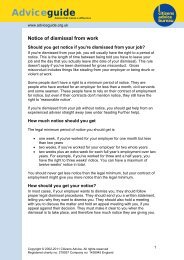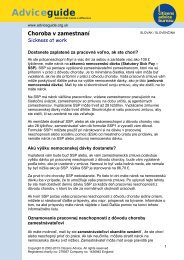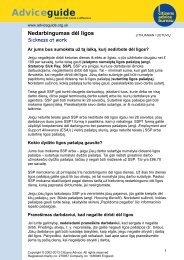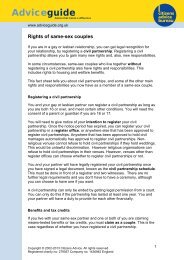Ending a marriage - AdviceGuide
Ending a marriage - AdviceGuide
Ending a marriage - AdviceGuide
You also want an ePaper? Increase the reach of your titles
YUMPU automatically turns print PDFs into web optimized ePapers that Google loves.
Adviceguide<br />
Advice that makes a difference<br />
Information applies to Scotland only<br />
<strong>Ending</strong> a <strong>marriage</strong><br />
When your <strong>marriage</strong> comes to an end, you will probably have a number of things<br />
to sort out, which may include childcare, money, and housing. Both of you could<br />
decide to separate informally, without going to court. You could draw up a<br />
separation agreement, either with or without the help of a solicitor, setting out<br />
future arrangements. However, it is advisable to use a solicitor if you want to do<br />
this because of the possible long-term consequences for your financial situation.<br />
If you want to end your <strong>marriage</strong> formally, you will have to go to court to get a<br />
divorce. It is advisable to try and sort out any disagreements about practical<br />
matters before going to court. This will reduce the legal costs and may also<br />
minimise conflict and the stress of the divorce proceedings.<br />
Who to inform<br />
If you and your partner are separating you may need to inform:<br />
your landlord your benefits office<br />
your housing benefit office your tax office<br />
your council tax office your children’s school<br />
your mortgage lender your bank<br />
<br />
gas, electricity and phone<br />
companies<br />
<br />
hire purchase and credit<br />
companies<br />
insurance company post office to redirect mail<br />
doctor and dentist<br />
Judicial separation<br />
In special circumstances where one of you has a religious or moral objection to<br />
divorce the court may grant a judicial separation.<br />
Decree of nullity<br />
A <strong>marriage</strong> can be annuled if it doesn’t meet certain legal conditions, for example<br />
one of you is under the age of 16 or is already married to someone else.<br />
Divorce<br />
There are two legal grounds for divorce. These grounds are that:<br />
the <strong>marriage</strong> has broken down irretrievably (see below)<br />
an interim gender recognition certificate has been issued to either<br />
spouse. An interim gender recognition certificate is issued to a transsexual<br />
person who has started the legal process of recognition of her/his acquired<br />
gender.<br />
www.adviceguide.org.uk 1/5<br />
Copyright © 2002-2013 Citizens Advice. All rights reserved<br />
Registered charity no: 279057 Company no: 1436945 England
Adviceguide<br />
Advice that makes a difference<br />
Information applies to Scotland only<br />
If you want to get a divorce because you believe that your <strong>marriage</strong> has<br />
irretrievably broken down, you have to be able to show to the court that this has<br />
happened. You can prove the irretrievable breakdown in one of the following<br />
ways:<br />
adultery<br />
unreasonable behaviour<br />
one year of separation with consent, where both of you consent to divorce<br />
two years of separation without consent.<br />
There is no minimum period you must be married before you may apply for a<br />
divorce based on unreasonable behaviour or adultery.<br />
A divorce can be brought to a local sheriff court or the Court of Session in<br />
Edinburgh. It may be easier and cheaper to use a local sheriff court than the Court<br />
of Session.<br />
There are two different methods of applying for a divorce – a quick, less<br />
expensive Do-It-Yourself method which can only be used in certain<br />
circumstances and the ordinary method for which you will need a solicitor.<br />
The Do-It-Yourself method<br />
You can get divorced using the Do-It-Yourself (DIY) procedure if the reason for<br />
your divorce is irretrievable breakdown based on one year separation with<br />
consent or two years separation without consent, or the reason is the issue of an<br />
interim gender recognition certificate. You cannot use this method if you have<br />
children who are under 16. In addition, you cannot use this method if there are<br />
financial issues to be sorted out.<br />
The DIY procedure will usually take about two months. However you may wish to<br />
see a solicitor before you apply for a DIY divorce to ensure that you will not lose<br />
out financially. If you do then decide to apply for a DIY divorce, you will need to fill<br />
in the necessary forms. You can get these from any sheriff court (or the Court of<br />
Session in Edinburgh) or from the Scottish Courts Service website at<br />
www.scotcourts.gov.uk. You can find the address of your local sheriff court on the<br />
Scottish Courts Service website or by looking up courts in the local telephone<br />
directory. You can get help to fill out the forms from a Citizens Advice Bureau –<br />
see under Further help.<br />
Getting divorced using the ordinary method is more expensive – and it can take<br />
up to six months or longer in some cases.<br />
Depending on your circumstances, you may be able to get financial help towards<br />
your divorce, including legal aid – see under Further help.<br />
The ordinary method<br />
If you are going to use the ordinary method to divorce you will have to consult a<br />
solicitor who will gather evidence about the grounds for divorce. An initial writ is<br />
served on your partner and to the court stating the grounds for divorce and any<br />
www.adviceguide.org.uk 2/5<br />
Copyright © 2002-2013 Citizens Advice. All rights reserved<br />
Registered charity no: 279057 Company no: 1436945 England
Adviceguide<br />
Advice that makes a difference<br />
Information applies to Scotland only<br />
arrangements to do with children, money or property. If your partner accepts the<br />
terms of the writ and decides not to defend the case the court will ask you and a<br />
supporting witness, usually a friend or family member who is aware of your<br />
circumstances, to submit sworn affidavits containing evidence of the information in<br />
the initial writ before granting the decree of divorce. If your partner disagrees with<br />
any aspect of the writ and defends the action in court then the court will have to<br />
decide on the arrangements for children, property and money. Your partner may<br />
decide to raise their own action, called a cross action, to start divorce proceedings<br />
against you. This is a complex matter, is likely to be expensive and will require<br />
legal advice.<br />
Family mediation or collaborative practice<br />
Before, or during, divorce proceedings, you may want to use a mediation service<br />
or collaborative practice. These are both options that can help you both to reach<br />
joint decisions about arrangements for the future. It is an alternative to having<br />
decisions made for you by the courts. Mediation involves you and your partner<br />
working towards agreement with a trained, impartial mediator. Collaborative<br />
practice involves you and your partner meeting with your solicitors to look at the<br />
issue and reach agreement. At the end of mediation or collaboration, the<br />
decisions you have reached can be used as the basis for a divorce settlement, or<br />
a legal separation agreement.<br />
To find out more about mediation services in your area, visit www.relationshipsscotland.org.uk<br />
or telephone 0845 119 2020.<br />
To find out more about collaborative practice, visit www.consensus-scotland.com.<br />
Financial arrangements at the end of a <strong>marriage</strong><br />
After separation but before divorce, you may be able to get money called<br />
maintenance (the legal term is aliment) from your husband or wife for yourself.<br />
This is because you and your spouse each have a legal obligation to provide<br />
financial support for the other until you are divorced.<br />
During the divorce proceedings, both you and your partner can ask the court to<br />
make a number of orders about money. When you have no children, the court is<br />
likely to try and make orders that give you a ‘clean break’ from each other. To find<br />
out more you should seek legal advice.<br />
If you have been financially dependent on your partner and you do not work, you<br />
may be able to claim benefits, or tax credit – see under Further help.<br />
The family home and possessions<br />
When a <strong>marriage</strong> breaks down, one of the important decisions is who gets the<br />
house and possessions. On separation, you may have agreed some decisions<br />
between you. If you and your partner cannot agree, you should check what rights<br />
you have to live in the home and use the possessions. A lawyer or your local<br />
Citizens Advice Bureau can help with this – see under Further help.<br />
www.adviceguide.org.uk 3/5<br />
Copyright © 2002-2013 Citizens Advice. All rights reserved<br />
Registered charity no: 279057 Company no: 1436945 England
Adviceguide<br />
Advice that makes a difference<br />
Information applies to Scotland only<br />
On divorce the court can make a wide variety of orders about the home and<br />
possessions. These orders will normally be made along with orders about money.<br />
If you decide to leave your home, depending on your circumstances you may be<br />
able to apply for long-term accommodation from your local authority as a<br />
homeless person – see under Further help.<br />
Tenants<br />
If you have a joint tenancy you may be able to agree between yourselves about<br />
which one of you should get the tenancy. You can ask your landlord to transfer the<br />
tenancy. If you cannot agree, the court can be asked to decide about a transfer.<br />
The court can transfer the tenancy to your name, even if your partner is the sole<br />
tenant, or you and your partner are joint tenants.<br />
If your partner is the sole tenant they will still be responsible for paying the rent. If<br />
rent arrears are building up the landlord may seek to evict you.<br />
If the tenancy is in your name you may be able to get help with your housing costs<br />
for example housing benefit and Council Tax Reduction – see under Further help.<br />
Owner-occupiers<br />
The long-term right to ownership of your property can be decided during divorce<br />
proceedings. The court has the power to transfer property regardless of original<br />
ownership. If you decide to move out, you will usually have the right to move back<br />
in at a later date (although this is time limited), and to stop your partner selling the<br />
property without your knowledge. If there are children, the courts can include<br />
property as part of an overall settlement to protect the children.<br />
You may be able to get help with your housing costs for example, council tax<br />
benefit and help with your mortgage – see under Further help.<br />
Children<br />
At the end of your <strong>marriage</strong>, both you and your partner will be responsible for<br />
supporting your children financially, regardless of which one of you the children<br />
live with. There is a useful guide called ‘Parenting Agreement for Scotland –<br />
Guide’ available to help separating parents make decisions about the care of their<br />
children available from the Scottish Government website at www.scotland.gov.uk<br />
If it is not possible to come to a voluntary agreement for the care of your children,<br />
a court can be asked to intervene. The court can make orders about who the<br />
children should live with. The order will usually allow contact between the child<br />
and the parent with whom the child is not living, unless there are exceptional<br />
circumstances.<br />
Claims for maintenance for children are either dealt with by voluntary agreement,<br />
or from a court order or the Child Support Agency (CSA) or Child Maintenance<br />
Service (CMS). If your children live with you after your <strong>marriage</strong> ends, you can<br />
use the CSA or CMS to get maintenance for the children, but you don’t have to. If<br />
you want advice about anything to do with maintenance agreements you can<br />
phone the Child Maintenance Options (CMO) helpline on 0800 988 0988 or look<br />
at the CMO website at www.cmoptions.org.uk.<br />
www.adviceguide.org.uk 4/5<br />
Copyright © 2002-2013 Citizens Advice. All rights reserved<br />
Registered charity no: 279057 Company no: 1436945 England
Adviceguide<br />
Advice that makes a difference<br />
Information applies to Scotland only<br />
Nationality and immigration status<br />
In some cases, the immigration status of a partner may be affected by separation<br />
or divorce, for example if someone separates or divorces within two years of<br />
applying for settled status. You will need specialist legal advice.<br />
Further help<br />
Citizens Advice Bureau<br />
Citizens Advice Bureaux give free, confidential, impartial and independent advice<br />
to help you solve problems. To find your nearest CAB, including those that give<br />
advice by e-mail, click on nearest CAB, or look under C in your phone book.<br />
Other information which might help<br />
Help with legal costs Using a solicitor<br />
What benefits can I get? Finding accommodation<br />
Help with mortgage costs Getting Divorced in Scotland booklet<br />
<strong>Ending</strong> a <strong>marriage</strong> Help with your rent – Housing<br />
Benefit<br />
<br />
<br />
Council Tax Reduction – what is<br />
Council Tax Reduction<br />
Child maintenance – where to start<br />
Family FAQs<br />
Last updated: 19 February 2014<br />
This fact sheet is reviewed on a monthly basis. The law changes frequently. To<br />
confirm you are looking at the most up-to-date version, download the fact sheet<br />
from www.adviceguide.org.uk or contact your local Citizens Advice Bureau.<br />
Produced by Citizens Advice Scotland (Scottish charity number SC016637), an<br />
operating name of The Scottish Association of Citizens Advice Bureaux. This fact<br />
sheet provides general information only and should not be taken as a full<br />
statement of the law.<br />
www.adviceguide.org.uk 5/5<br />
Copyright © 2002-2013 Citizens Advice. All rights reserved<br />
Registered charity no: 279057 Company no: 1436945 England


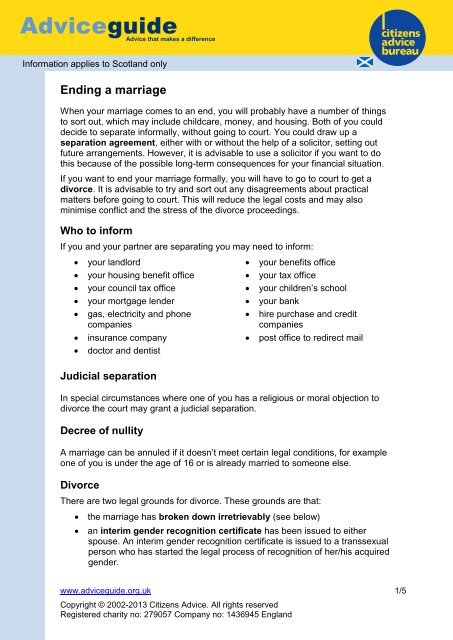
![Sample debt letters [ 33 KB] - AdviceGuide](https://img.yumpu.com/50757075/1/184x260/sample-debt-letters-33-kb-adviceguide.jpg?quality=85)
